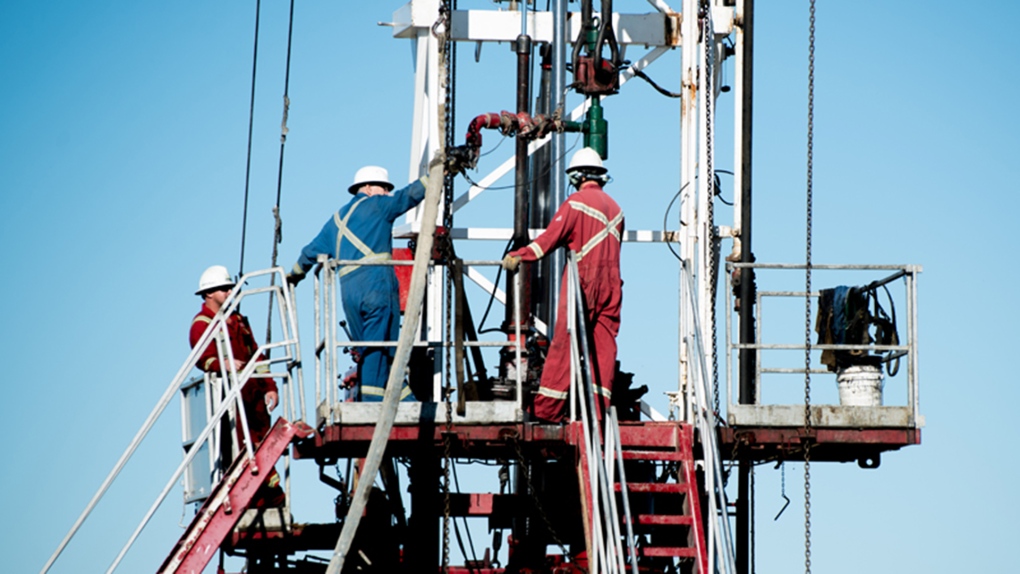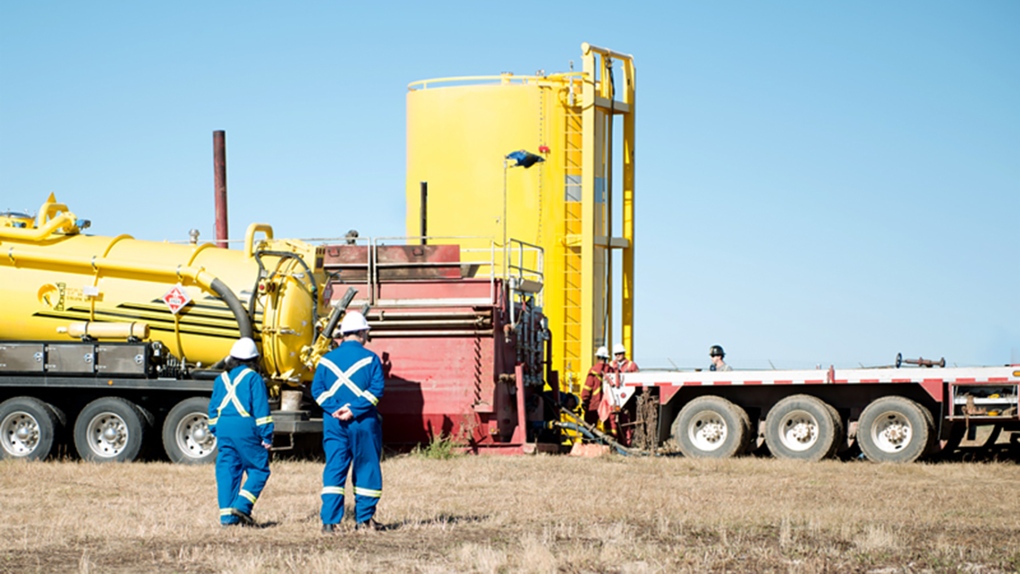'How much time do we have?': 'Contamination' in Prairie groundwater identified
 A gas well is shown being drilled near the home of Mike Judd, west of Pincher Creek, Alberta, in this handout photo from 2010. THE CANADIAN PRESS/HO, Gordon Petersen
A gas well is shown being drilled near the home of Mike Judd, west of Pincher Creek, Alberta, in this handout photo from 2010. THE CANADIAN PRESS/HO, Gordon Petersen
A compound used to treat sour gas that's been linked to fertility issues in cattle has been found throughout groundwater in the Prairies, according to a new study.
Scientists at the University of Guelph and University of Saskatchewan have identified "large contaminant plumes" of sulfolane, particularly in Alberta.
Dr. Erica Pensini, associate professor at Guelph's school of engineering, says researchers are tracking how it is spreading in groundwater, work that could help identify risks to supplies of potable water.
- Sign up for breaking news alerts from CTV News, right at your fingertips
- The information you need to know, sent directly to you: Download the CTV News App
She says the study suggests that naturally-occurring sulfates (salts) react with sulfolane in groundwater and its ability to "mix more thoroughly with water."
"Sulfolane plumes travel faster with fewer sulfates, so we're trying to clarify migration in the context of what can we do to tackle this contamination," said Pensini in a news release.
"We're also partnering up with hydrogeologists and eco-toxicologists to explore other aspects that we're not directly exploring in our lab," said Pensini.
What is sulfolane?
Sulfolane, introduced to the market in 1944 by Shell Oil, is "widely used" to remove hydrogen sulfide – a process better known as 'sweetening' – from sour gas at thousands of sites across Alberta.
Sulfolane is virtually invisible and doesn't have a particularly strong smell, so it is nearly undetectable in bodies of water.
"In most cases, you would not notice its presence," Pensini told CTV News in a statement.
According to a 2008 report by WorleyParsons Komex for Shell Energy Canada, sulfolane was first detected in groundwater in the 1980s and, in 1994, a monitoring program was put in place.
A regional sulfolane monitoring program, which began in 1998, detected sulfolane in off-site groundwater near Shell's Waterton facility.
By 2007, Shell began actively working to remove sulfolane, building on a pilot project conducted in 2003 and 2004.
Nevertheless, Pensini says the toxicity of the chemical was not fully understood, so it was improperly disposed of.
"It was therefore released in aquifers by sour gas and sour oil processing plants. There were 5,250 plants in 2007 (in Alberta), based on official sources," she said.
"Each of these plants could have released different amounts."
According to the Canadian government, "the toxicological database for sulfolane is limited."
"Overall, oral exposure to sulfolane in experimental animals was associated with immunological, renal and reproductive and developmental effects," the government's website reads.
Health Canada says the compound is not likely to accumulate in the human body, but that more than 0.3 milligrams of sulfolane per litre of drinking water is unacceptable.
"Health Canada establishes screening values for contaminants at the request of federal departments, provinces and territories (jurisdictions). These requests are usually made when there is a concern for human health because the presence of a contaminant is suspected or detected in local source water and that contaminant does not have an established limit in drinking water."
The agency says there are no regulatory limits for sulfolane in other countries, but sulfolane groundwater contamination did prompt authorities in North Pole, Alaska, to include it in the U.S. National Toxicology Program.
Research into whether or not sulfolane poses a risk to human health is still ongoing, Pensini says, but some companies have already raised concerns.
"For example, Sigma Aldrich, a leading chemical supplier, lists this hazard in their (safety data sheets)," she told CTV News in a statement.
"There is sufficient evidence for its impact on fertility for these to be officially reported."
 Crews working on a decommissioned sour gas well in south Calgary in 2017. (Supplied/AER)
Crews working on a decommissioned sour gas well in south Calgary in 2017. (Supplied/AER)
Shell working with University of Guelph
Shell Canada says it is aware of Pensini's research and has been working with the University of Guelph since 2022.
"Shell believes a collaborative and cooperative approach with academia is key to improve environmental practices," a Shell spokesperson wrote in an email to CTV News.
Shell, which has operated sour gas wells in the Foothills – Jumping Pound, Caroline and Waterton – for 70 years, says it has also worked with the Alberta Energy Regulator (AER) as well as stakeholders and landholders for the past 10 years.
In 2019, Shell sold those sour gas wells to Pieridae, but it is still responsible for "managing and remediating any impacts at the Waterton and Jumping Pound gas plants."
Shell Canada did not admit that sulfolane poses a risk to human health, but said its work with the University of Guelph "is an important step in advancing the science."
Rules in place for companies
According to the AER, the body that monitors companies in Alberta's energy sector, there are 27,562 active sour gas wells in the province, a figure that does not include inactive, abandoned and reclaimed wells.
Many more are scheduled to be drilled, the AER said in a statement to CTV News.
In addition to other regulations, the agency says all facilities that process sour gas require approval under Alberta's Environmental Protection and Enhancement Act (EPEA).
Contamination still present in Alberta groundwater
Pensini acknowledged that "practices have changed" when it comes to the handling of sulfolane.
"New sulfolane contamination is most probably less significant," she said. "Filters contaminated with sulfolane are no longer being washed directly into aquifers."
However, she adds that several decades' worth of contamination is still present in Alberta's groundwater.
Pensini says Canadian Light Source, a national research facility at the University of Saskatchewan, has been "instrumental" in understanding the spread of sulfolane.
"We can probe aspects that we couldn't probe anywhere else, so it is really, really important to us for this research," she said.
The team's findings have been published in the journal Physics of Fluids.
 (Supplied/AER)
(Supplied/AER)
The Alberta government says it's aware of the study.
"Provincial groundwater monitoring has not detected any notable increases in sulfolane levels in groundwater," said Ryan Fournier, press secretary for Environment Minister Rebecca Schulz, in a statement to CTV News.
Fournier says the government will be reviewing the study's findings.
CTVNews.ca Top Stories

Alberta calls in army to assist with wildfire situation
Alberta has called in the Canadian Armed Forces to help assist with the worsening wildfire situation in the province.
DEVELOPING First responders relocated from Jasper National Park to Hinton due to wildfire activity
Vehicles and heavy equipment have been seen leaving Jasper National Park throughout Wednesday afternoon.
2 wildfires less than 8 km away from Jasper townsite, some structures impacted in national park
As the evacuation order continues for Jasper National Park, officials confirm that some structures in the park have been damaged by fire, but they can't confirm what those structures are.
WATCH LIVE Biden uses Oval Office address to explain his decision to quit 2024 race, begin to shape legacy
Insisting that 'the defence of democracy is more important than any title,' U.S. President Joe Biden on Wednesday explained in an Oval Office address his decision to drop his bid for reelection and to throw his support behind Vice President Kamala Harris.
Barrie-Innisfil MPP 'blacked-out' and crashed car into window of child care centre
Staff at a Barrie child care centre say they are frustrated by what they call a local MPP's inadequate response after a car crashed through a window in one of the toddler rooms.
2 Canadians being 'sent home immediately,' removed from Olympic team after drone incident
An analyst and an assistant coach with Canada Soccer are being removed from the Canadian Olympic Team and 'sent home immediately,' according to the Canadian Olympic Committee.
An unwelcome attendee has joined the Paris Olympic Games: COVID-19
After a handful of Australian water polo players tested positive for COVID-19 this week, questions have emerged around how the spread of the disease will be mitigated at the Summer Olympic Games in Paris.
Male, female killed, 2 others injured in 'gun battle' outside Toronto plaza: police
Two people are dead and two others suffered serious injuries following a shooting that police have described as a 'gun battle' outside a plaza in Scarborough, Ont. early Wednesday morning.
Wildfire north of Calgary prompts evacuation alert, highway closures
A wildfire is prompting evacuations and highway closures north of Calgary.

































